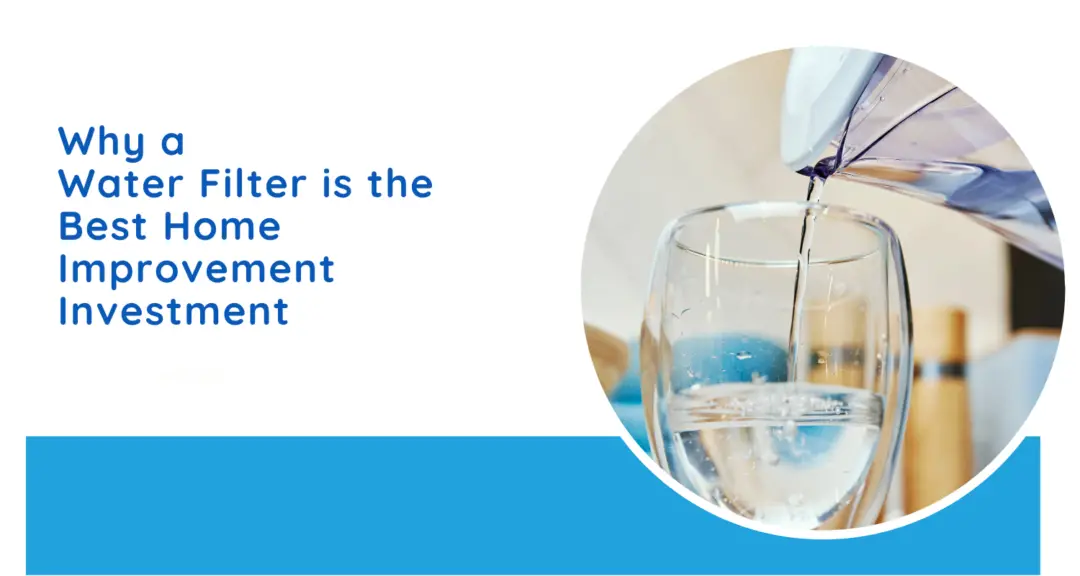
Why a Water Filter is the Best Home Improvement Investment
Water is essential to every person in the world. But thanks to the constant dangers of pollution from corroded pipelines and decades of industrial waste, water quality has hit new lows.
Many families are now exposed to contaminated water and are at risk of contracting water-borne illnesses. The only way to improve contaminated home water is by treating it with effective water treatment methods. Water filters are one of the most efficient home water treatment systems right now. Here we explain why installing a water filter in your home is one of the best home improvement investments you can make. We’ll also be giving you some tips on some filters to invest in!
Why You Need a Water Filter
Like it or not, untreated home water is often contaminated. Some contaminants are visible (like dirt or sand), and others are too small to be seen. These contaminants put your health at risk and may also affect your water-using appliances. Harmful pollutants in your water include:
1 – Heavy Metals
Heavy Metals are natural elements found in the Earth’s crust. Even a small amount of heavy metals in your water can be highly toxic- they can cause multiple organ failures, nervous system disorders, and cancer. Heavy metals that might be present in home water include lead, mercury, iron, arsenic, and chromium. You can remove heavy metals from your water by using reverse osmosis or ion-exchange systems.
2 – Pesticides
Pesticides are usually found in well water around farmlands. They get into water from agricultural runoff from farms and can also seep through the soil into groundwater. Your well water comes from groundwater–so you can see how contaminated groundwater is a problem.
Pesticide-contaminated water can affect your health shortly after you drink it or after prolonged use. You may experience symptoms like rashes, stinging eyes, or diarrhea. In severe cases, blindness or death may occur.
Simply boiling your water will not eliminate pesticides (boiling your water will only increase pesticide concentration in it). A better alternative would be installing activated carbon filters.
3 – Water Disinfectants & Disinfection Byproducts
Water agencies disinfect or cleanse municipal water with chlorine and chloramines, which are highly effective disinfectants. They make drinking water safe to consume by deactivating the microorganisms in it.
Unfortunately, chlorine gives off an unpleasant bleach-like smell. Chlorine can also react with organic substances in the water to form DBPs (disinfection byproducts). DBPs may cause liver damage and decreased nervous system activity when consumed in significant amounts.
Many carbon-based whole house water filtration systems effectively remove chlorine and DBPs from water. However, chloramines are more challenging to remove and require catalytic carbon filter technology.
4 – Bacteria
Many infectious microorganisms can make their way into your water supply through the environment. Wastewater discharged into lakes, rivers, and seas is the major source of bacterial contamination.
Types of Water Filters You Can Get (and Their Price Range)
Installing a water filter in your home saves you from drinking or cooking with contaminated water. Home water filters are either point-of-use systems or point-of-entry systems. Point-of-entry water filtration systems are installed at the point where water enters the home (the mainline), and they supply filtered water throughout the house. Point-of-use systems only work at a particular sink or faucet.
Water filters are effective against different contaminants. Depending on the contaminants in your water, you can get any of these water filters:
POE Filters
Whole house filters are one of the most efficient water filters if you want to cover the entirety of your home. They are point-of-entry filters, and they remove chemicals and bad tastes from water. They can also prevent sediment and scale build-up and thoroughly purify your water. Whole house water filters are relatively pricey, but you can get a basic whole house system for under $1000; advanced whole house filters cost far more. Of course, there is also the installation cost to consider.
POU Filters
Under sink water filtration systems are cheaper than whole house systems and less complicated, but they only filter the water from a single faucet. They’re easier to install than whole house water filters. As the name implies, they’re placed under a sink and filter water coming from the sink’s faucets.
Under sink water filters cost around $200 to $1,300, but getting them at a lower price is still possible.
Water Distillers
Water distillers work by heating the water to its boiling point of 100°C and capturing the steam. That steam is then cooled, condensed, and stored. Contaminants that can’t turn into steam are left behind. Depending on the model you’re going for, you can get a water distiller for around $300 to $5000.
UV Filters
Ultraviolet (UV) water filters kill microorganisms in water by passing water through a UV system and exposing that water to UV light. The ultraviolet light kills the cells of microorganisms and makes them unable to reproduce. This filtration method kills 99.99% of microorganisms in the water, and it costs around $400 to $1,500.
There are other water filters like reverse osmosis filters, activated carbon filters, and sediment filters. Water filters serve the same purpose in general. They:
1. Improves Water Quality – A water filtration system in your home is guaranteed to improve your water quality by removing contaminants and providing tasteless and odorless water. If you can see sediments in your water, it’s best to go for a whole house sediment filter. Sediment filters eliminate sediments and other particles that could clog your pipes.
2. Prolong Lifespan of Home Appliances – Water filters can help reduce scale build-up in appliances and prevent orange iron or rust stains from tainting your appliances. In addition, they ensure that your water-using devices last longer and work smoothly.
Regardless of your water filtration demands, one of the best things you can do for your household is invest in a reliable water filter system. Water filters are a significant financial investment for your home, and they are the best option if you’re concerned about the state of your water.


No Comments